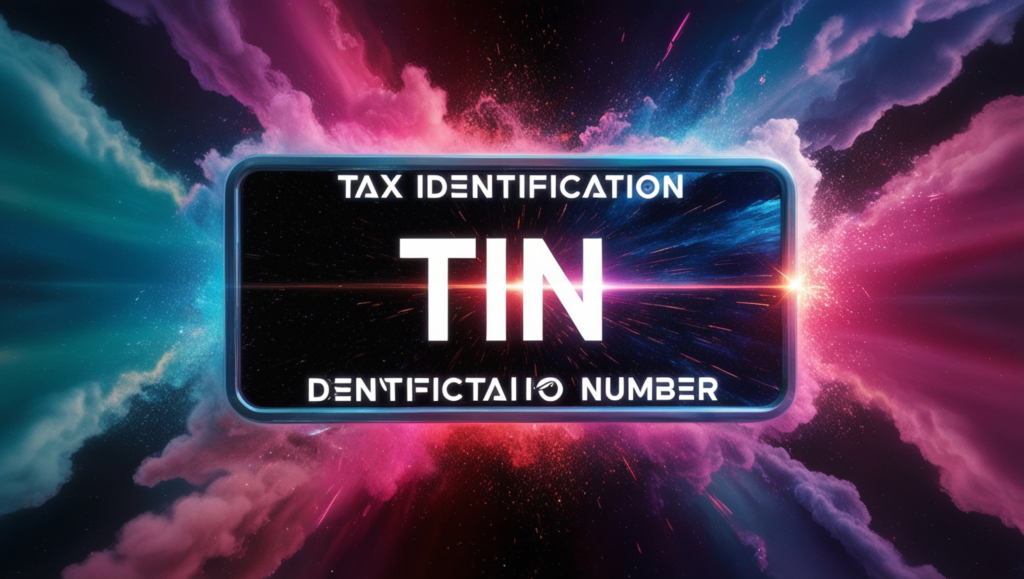A Tax Identification Number (TIN) is a unique identifier used by governments to track individuals, businesses, and other entities for tax purposes. In the United States, for example, individuals often use their Social Security Number (SSN) as their TIN, while businesses typically use an Employer Identification Number (EIN). This number is essential for filing tax returns, opening bank accounts, and conducting various financial transactions, ensuring that the government can properly monitor tax obligations.
Obtaining a TIN is a straightforward process, but it’s crucial to keep it secure to prevent identity theft or fraud. Whether you’re self-employed, running a business, or simply filing personal taxes, understanding how your TIN works and how to protect it is key to maintaining compliance with tax laws. Different countries may have varying procedures for issuing TINs, so it’s important to consult local tax authorities for specific guidelines.
Types of TINs: Which One Do You Need
There are several types of Tax Identification Numbers (TINs), each serving a specific purpose depending on the individual’s or entity’s tax situation. In the U.S., the most common types are the Social Security Number (SSN), Employer Identification Number (EIN), Individual Taxpayer Identification Number (ITIN), and Adoption Taxpayer Identification Number (ATIN).

The SSN is used by individuals for personal tax reporting, while the EIN is assigned to businesses, non-profits, and other entities for their tax purposes. An ITIN is for individuals who are not eligible for an SSN but still need a TIN for tax reporting, such as non-resident aliens, their spouses, or dependents.Choosing the correct TIN is crucial for proper tax reporting and compliance. Individuals who are U.S.
citizens or permanent residents typically use an SSN, while those operating businesses, hiring employees, or filing as a corporation will need an EIN. Non-resident aliens or foreign nationals must apply for an ITIN. It’s important to apply for the right TIN to avoid delays or penalties, and if you’re unsure, consulting with a tax professional or the IRS can help ensure you get the right number for your situation.
Also Read: European Countries With Low Tax
Why is a TIN Important for Tax Purposes

1. Tax Reporting and Filing
A Tax Identification Number (TIN) is crucial for accurate tax reporting and filing. It helps the government identify and track income, deductions, and credits associated with an individual or business. Without a valid TIN, the IRS (or other tax authorities) cannot process tax returns, which could delay refunds or result in penalties.
2. Legal Requirement
In many countries, including the United States, a TIN is a legal requirement for individuals and businesses to engage in activities like employment, business transactions, and even opening bank accounts. Failure to obtain or use the correct TIN may lead to fines or legal complications.
3. Prevention of Identity Fraud
A TIN acts as a safeguard against identity theft and fraud. By providing a unique number, it ensures that the tax records of individuals and entities are accurately tracked and cannot be easily misused by others. This is particularly important for businesses, where the EIN serves as a barrier against fraudulent activity.
4. Simplifies Financial Transactions
Having a TIN streamlines various financial activities, such as applying for loans, credit cards, or other financial products. Lenders and financial institutions often require a TIN to verify identity and ensure compliance with tax obligations before processing applications or transactions.
5. International Tax Compliance
For individuals or businesses with international dealings, a TIN is essential for complying with tax treaties and regulations. It helps avoid double taxation, ensures proper reporting of cross-border income, and maintains adherence to international tax standards, particularly in the case of non-resident aliens or foreign entities.
How to Apply for a TIN: Step-by-Step Guide
1. Determine Which TIN You Need
The first step in applying for a TIN is determining which type you need. If you’re an individual and a U.S. citizen or permanent resident, you likely need a Social Security Number (SSN). If you’re a business or entity, you’ll need an Employer Identification Number (EIN). Non-resident aliens, spouses, or dependents in need of a TIN for tax purposes will apply for an Individual Taxpayer Identification Number (ITIN).
2. Gather Required Documents
Once you’ve identified the correct TIN, gather the necessary documentation. For an SSN, you’ll need proof of citizenship or legal residency, such as a birth certificate or green card. For an EIN, businesses must provide information about the business structure, such as its name, legal form, and owners. For an ITIN, you’ll need a valid passport or other identification documents to prove your identity and foreign status.
3. Submit Your Application
After gathering the required documents, submit your application. You can apply for an SSN through the Social Security Administration (SSA), either online, by mail, or in person at your local SSA office. To apply for an EIN, businesses can use the IRS online application tool. For an ITIN, individuals need to complete IRS Form W-7 and submit it along with the necessary supporting documentation. Be sure to follow the specific instructions for your type of TIN to avoid delays.
Who Needs a TIN and When
Who Needs a TIN:
- U.S. Citizens and Permanent Residents – Required for tax reporting and to file tax returns.
- Self-Employed Individuals – Needed to report income, file taxes, and claim deductions.
- Business Owners – Required for business taxes, employee payroll, and tax filings (EIN).
- Employees – Required by employers to report wages and withhold taxes (using SSN).
- Non-Resident Aliens – Individuals who need to file taxes in the U.S. but are not eligible for an SSN (ITIN).
- Dependents and Spouses of Non-Residents – When they need to be listed on U.S. tax returns.
- Independent Contractors – Required for reporting income, submitting 1099 forms, and paying taxes.
- Investors – Needed for reporting income from investments, such as dividends and interest.
- Retirees – Required for filing tax returns on retirement income, such as pensions and Social Security.
- Adoptive Parents – Required for claiming adopted children as dependents (ATIN).
When to Apply for a TIN:
- Filing a Tax Return – If you need to file taxes and don’t already have a TIN.
- Starting a Business – When forming a business or hiring employees.
- Receiving Income – If you’re earning income that needs to be reported to the IRS (e.g., freelancing or investments).
- Claiming Tax Credits – If you’re claiming tax benefits like the Child Tax Credit, you need a TIN for each dependent.
- Opening Bank Accounts – When opening a bank account for personal or business purposes.
- Hiring Employees – Businesses need an EIN before hiring employees and filing payroll taxes.
- Applying for a Loan – Some financial institutions require a TIN to verify your identity and report income.
- Estate and Trust Administration – When managing estates or trusts, an EIN is required for tax purposes.
- Non-Resident Alien Status – If you need to report U.S. income but are not a U.S. citizen or resident.
- Adoption – When applying for an ATIN to claim an adopted child as a dependent.
Common Uses of a TIN Beyond Tax Filing
It is used when opening bank accounts, applying for loans, or setting up credit lines, as financial institutions often require it to verify identity and track financial activity. Additionally, businesses use their TIN (EIN) for registering with state and federal agencies, paying employees, and complying with employment tax laws.
A Tax Identification Number (TIN) is not only essential for tax filing but also plays a key role in various other financial and legal activities. TINs are also required for applying for government benefits, receiving Social Security, and even enrolling in certain health insurance programs. Essentially, a TIN serves as a universal identifier in many aspects of legal and financial dealings.
How to Protect Your TIN from Fraud
Protecting your Tax Identification Number (TIN) from fraud is crucial to avoid identity theft and financial loss. Keep your TIN secure by never sharing it unnecessarily, especially over the phone, email, or online unless you are certain of the recipient’s identity. Store physical documents containing your TIN in a safe place and consider using secure digital storage.

Always be cautious when receiving unsolicited requests for your TIN, and verify the legitimacy of the requester. Monitor your financial accounts and credit reports regularly for any signs of suspicious activity. If you suspect your TIN has been compromised, report it to the relevant authorities, such as the IRS or your financial institution, immediately.
What to Do if You Lose Your TIN or it Becomes Invalid
If you lose your TIN or suspect it has been compromised, the first step is to contact the relevant authority to report the issue. For a lost Social Security Number (SSN), you should reach out to the Social Security Administration (SSA) to request a replacement card. If it’s an Employer Identification Number (EIN), contact the IRS for assistance.
In cases where an Individual Taxpayer Identification Number (ITIN) is lost, the IRS can issue a new one. It’s important to act quickly to prevent potential misuse of your TIN.If your TIN becomes invalid, whether due to a clerical error or a change in your status (like a name change or citizenship status), you’ll need to update your records with the IRS or the appropriate agency.
This might involve submitting documentation to correct the issue, such as a court order, marriage certificate, or proof of citizenship. Keeping your TIN information up-to-date is essential to ensure smooth tax filing and to avoid complications in other financial or legal matters.
FAQs
What is a TIN?
A Tax Identification Number (TIN) is a unique identifier used by tax authorities to track individuals, businesses, and other entities for tax purposes.
Who needs a TIN?
Individuals, businesses, and non-resident aliens who need to file taxes, open bank accounts, or engage in financial transactions typically need a TIN.
How do I apply for a TIN?
You can apply for a TIN through the IRS website, local Social Security Administration office, or by submitting the appropriate forms for your situation (e.g., SSN, EIN, ITIN).
What should I do if I lose my TIN?
If you lose your TIN, contact the appropriate agency (e.g., SSA for SSNs, IRS for EINs) to request a replacement or correction.
Can I use my TIN for purposes other than taxes?
Yes, a TIN is often required for activities like opening bank accounts, applying for loans, and verifying identity for government benefits.
Conclusion
In conclusion, a Tax Identification Number (TIN) is a vital tool for both individuals and businesses in maintaining compliance with tax laws and engaging in various financial and legal activities. Whether you’re filing taxes, opening a bank account, or applying for loans, your TIN is an essential part of identifying you in the eyes of tax authorities and financial institutions.
Protecting your TIN from fraud and ensuring it’s up to date are crucial steps in safeguarding your identity and avoiding potential complications. By understanding the different types of TINs, knowing how to apply for one, and taking proactive steps to secure it, you can ensure smooth and compliant financial operations in both your personal and professional life.



